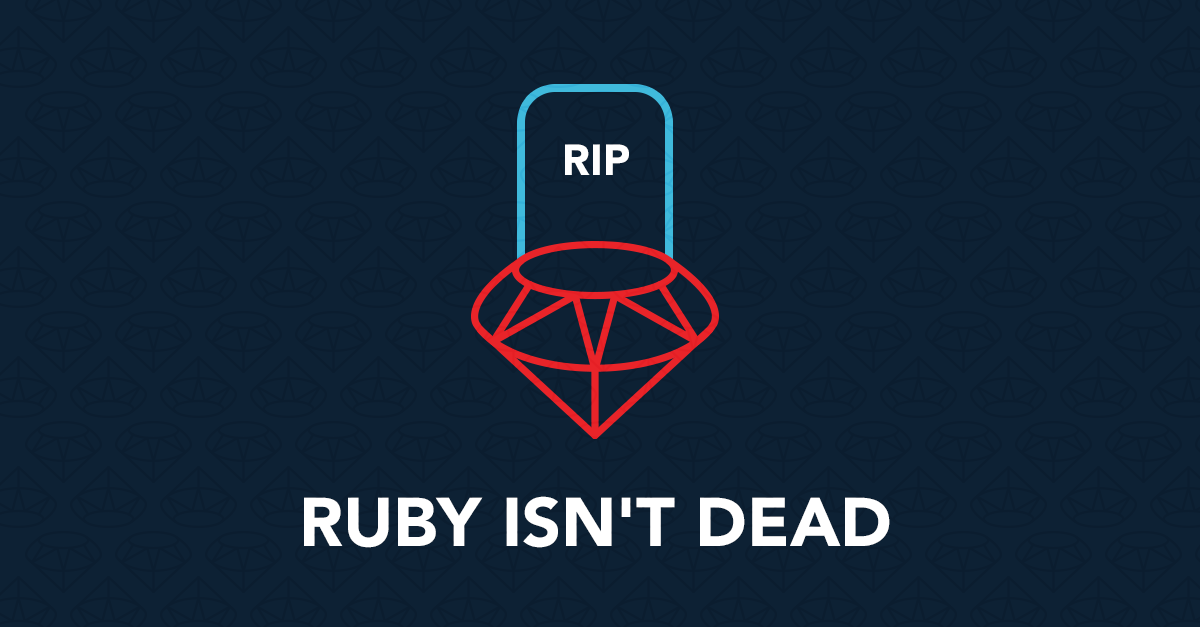Ruby Isn’t Dead

Some might say 2014 has been a year of programming related death. TDD is dead. Agile is dead. The Framework is dead. If this keeps up, all of programming should be dead by about December 31st.
Earlier this year I was lucky enough to attend a small conference in Southern france known as Ruby Lugdunum. In the late afternoon of the final day we retreated to a cafe and there was a panel discussion on the future of Ruby hosted by Joshua Ballanco. The beginning thrust of the panel discussion, which featured such Ruby luminaries as Terence Lee, Chris Kelly, and Sam Phippen, was the idea of Ruby fading away or dying out.
The idea itself disturbed me. Maybe my head was in the sand and I missed something, but I love Ruby. It’s easily the favorite of all the languages I’ve programmed with. It couldn’t be dying… it just couldn’t!
So I listened and what I heard was more supportive than disheartening.
Faster Sometimes Equals Better
When it comes to performance and scaling, we all know Ruby is a bit of a laggard. The language itself was never designed to be The Fastest Thing In The World™. It was designed for programmer happiness: not speed, not scalability. Just happiness. In all my time in the community I believe I can say that has worked. Sure we have our complaints. We’re developers - we ask for perfection from imperfect systems.
The issues of speed and scalability, though, weigh on the minds of the Matz and the Core Team as well it seems. During the panel discussion, Terence Lee mentioned the desire for the team to do something about these issues. While they attempt to find a balance in the workload, these issues are being considered and worked on. While Ruby will never approach C speeds, we will see improvements. This seems to indicate life still breathes in the Ruby ecosystem. If it were dying, why tackle these issues now?
It’s Just Not New Anymore
One of the biggest citations, not just at the panel but in many articles out this year, is Ruby has “matured”. This is more or less the statement of a language no longer being the new shiny toy in the room that everyone runs to. We’ve seen it in other languages. Over the last year we’ve seen people flock to new things like Go, Julia, Swift, and anything with a “.JS” appended to it. For a moment it seemed all the Rubyists were running to new shores.
Were it not for experience with other languages, people might have panicked. I recall people dropping everything to get into .NET, because it was the future and everything was going to be programmed using .NET. At the same time, Open Source languages were coming into fruition and have been part of the ecosystem more so than they had before.
There will always be new shiny baubles but stable, mature languages will always win out. Keep in mind, PHP is mature and is still a major part of the web. There are still Cobol and Perl developers in the world. These languages are not dead, but, in many ways, vibrant parts of the world of computing to this day. I see no reason why Ruby can’t be used to run systems and build applications for quite sometime.
The Community is Disappearing
Community is often a difficult thing to define. The Ruby community is large, international, and encompasses a number of disciplines. I’ve been fortunate enough to have the opportunity to interact with other programming communities, both Open Source and Enterprise, and few compare to the vastness of Ruby, or the interactivity. Part of the allure of Ruby, for me, is still the people.
Conference attendance is often difficult to predict. In the Ruby Community we had over 50 conferences in 2014. This includes the big ones like Ruby Conf and Rails Conf, Ruby confs from around the world, and small regional conferences like Steel City Ruby and Nickel City Ruby. With so many events and limited time, developers need to make often painful decisions to limit their travel to things within their region or budget. So you are seeing more people spreading their time across more conferences instead of a majority going to one or two events.
The important thing to keep in mind is the large number of people joining the community in general. There are Ada Academy, RailsBridge, RailsGirls, and GirlDevelopIT graduates, along with the Rubyists coming from more traditional education outlets, swelling our ranks regularly. This means our community continues to be vibrant and pertinent.
We are also seeing even more conferences like Ruby Conf Portugal and Ruby Conf Philippines, indicating there are still under-served members of the community who may not have participated in conferences.
The language and the community continue to thrive and continue to make developers happy. While 2014 may not have been a headline year for positive Ruby posts, perhaps 2015 will see a more lively discussion.
RUBY IS NOT DEAD!! LONG LIVE RUBY!!

















Share your thoughts with @engineyard on Twitter
OR
Talk about it on reddit